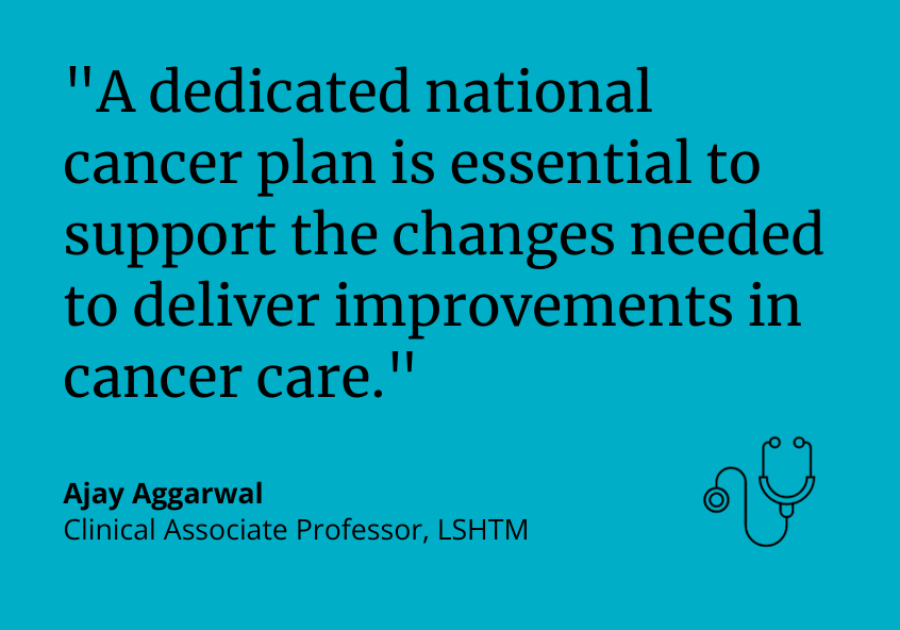Report calls for National Cancer Plan for UK
17 November 2023 London School of Hygiene & Tropical Medicine London School of Hygiene & Tropical Medicine https://lshtm.ac.uk/themes/custom/lshtm/images/lshtm-logo-black.png
The UK’s National Health Service (NHS) is currently facing major workforce deficits and cancer services are struggling to recover after the COVID-19 pandemic, according to a report published in The Lancet Oncology.
Written by a group of leading oncologists from across the UK, including experts from the London School of Hygiene & Tropical Medicine (LSHTM), the report proposes that a radical, yet sustainable, strategy is needed to address widening care disparities across regions and continuing low survival rates for some cancers.
The report was launched at an event in UK Parliament on 15 November 2023, where the authors set out ten recommendations to improve cancer care.
The report authors draw attention to the UK’s poor performance compared to other countries with all UK nations in the bottom half of cancer league tables. They advise that the loss of a dedicated National Cancer Plan in England and Wales has been a “major misstep” and call for new dedicated cancer policies to ensure there is a cancer service “fit for the future”, with up to 2,000 extra cancer cases per week expected by 2040.
Dr Ajay Aggarwal, Clinical Associate Professor at LSHTM and a co-author of the report, said: “Cancer represents a range of complex diseases that are challenging to manage. A dedicated national cancer plan is essential to support the changes needed to deliver improvements in cancer care from prevention, early diagnosis, and access, to delivery of high-quality evidence-based treatments alongside supporting patients living with and beyond cancer.”
The ten-point plan to improve UK cancer care
1. Create and properly resource a dedicated UK-wide National Cancer Control Plan through a more integrated devolved government consultation, that are patient centred; empower clinical frontline staff; and deliver equitable, affordable, data-informed, research-active cancer control.
2. Re-establish a strengthened and more comprehensive National Cancer Research Institute and broaden cancer research strategic agenda and funding.
3. Deliver on National Health Service (NHS) Long Term Workforce Plan with fair pay and better working environments coupled with a rethink on future cancer workforce skill sets.
4. Substantially strengthen primary care and deliver on the target of 75% of cases diagnosed at stage 1 or stage 2 by 2028 through enhanced screening.
5. Properly fund a UK-wide evidence-driven prevention programme particularly for tobacco control, alcohol, and obesity.
6. Integrate hospice care within the NHS and increase support for psychosocial and survivorship, keeping patients and those living with cancer out of hospitals.
7. Address domain specific and vulnerable population solutions in national planning such as in radiotherapy, surgery, pathology, imaging, systemic therapies, and in children and young adults.
8. Develop an integrated pan-UK data and digital infrastructure that delivers intelligence-driven service design, performance assessment, and quality improvement. This should be combined with cancer targets that focus on delivery of the main 62-day treatment target and reflect the totality of the system; time to diagnosis, time to treatment, quality metrics.
9. Deliver a sustainable plan for equipment and infrastructure across the UK to assist the work force and help increase their productivity and ensure patients with cancer can get access to appropriate technologies and that proven innovations are equitably implemented through a value-based approach.
10. Reassess governance, structure, and advice to government and NHS England for cancer. Reinstate the role of an independent National Cancer Director and office of support with authority to drive through changes and liaise between the government and the NHS to provide robust independent oversight.
Publication
Ajay Aggarwal, Ananya Choudhury, Nicola Fearnhead, Pam Kearns, Anna Kirby, Mark Lawler, et al.The future of cancer care in the UK—time for a radical and sustainable National Cancer Plan. The Lancet Oncology. doi.org/10.1016/S1470-2045(23)00511-9
LSHTM's short courses provide opportunities to study specialised topics across a broad range of public and global health fields. From AMR to vaccines, travel medicine to clinical trials, and modelling to malaria, refresh your skills and join one of our short courses today.